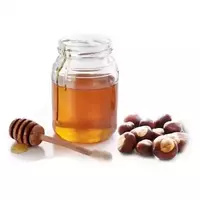Chestnut honey

A worthy place among the vast variety of all kinds of varieties and types of natural honey is chestnut honey. This natural product is collected by bees in the spring from large, candle-like, attractive flowers of the Crimean chestnut. Chestnut honey is a rather rare guest on our table, however, despite this, it deserves special attention.
First of all, the rather high cost of chestnut honey is explained by the relatively small amount of prey, since the Crimean chestnut is a rather rare tree. It is found in the regions of Transcaucasia and Crimea, as well as in such European countries as, for example, France. In central Russia, you can also often see a similar tree, but this is another variety of it, which is called horse chestnut. From the flowers of this tree, bees also gather precious nectar to produce such a rare variety of natural honey.
Obviously, chestnut honey is a fairly specific product, which can be said about its taste characteristics. To taste, this honey variety does not seem quite familiar, as it has a rather sharp taste and a pronounced hill, which disappears when heated. The useful properties of chestnut honey and its peculiar taste are especially appreciated abroad.
Another distinctive feature of chestnut honey is its weak tendency to crystallize. So, throughout the year at an average air temperature, it remains in liquid form. Moreover, the color of honey remains invariably dark brown and in crystallized form, but this applies exclusively to the product collected from the Crimean chestnut.
Speaking of honey from horse chestnut, it should be noted that on the contrary it thickens very quickly, and in any form it is practically devoid of color - it is transparent. The characteristic rich honey smell that one, that another variety of chestnut honey, can be said to lack.
Benefits of chestnut honey
The benefit of chestnut honey lies primarily in its unusually rich composition. This wonderful product has a high content of fructose, iron salts, copper and manganese, while it has a whole complex of vitamins of different groups. In addition, the amount of sucrose in this natural honey variety significantly exceeds the content of this substance in other similar products. Due to such features, the benefits of chestnut honey are manifested in a strong bactericidal and antiseptic effect.
That is why it is useful to consume this honey for people who suffer from disorders of the cardiovascular system, as well as diseases of the gastrointestinal tract (due to the sparing effect of the product on the mucous membranes). The benefits of chestnut honey are obvious in the therapy of thrombophlebitis and varicose veins, since the substances in its composition have a positive effect on the vessels. Chestnut honey has been proven to promote bile outflow and also increase appetite.
chestnut honey 284 kCal
Energy value of chestnut honey (Ratio of proteins, fats, carbohydrates - ju):
Proteins: 0 g (~ 0 kCal)
Fats: 0 g (~ 0 kCal)
Carbohydrates: 71g (~ 284kCal)
Energy ratio (b | y): 0% | 0% | 100%
 Español
Español Français
Français Português
Português Русский
Русский 简体中文
简体中文 繁體中文
繁體中文 日本語
日本語 한국어
한국어 العربية
العربية Türkçe
Türkçe Қазақ
Қазақ Deutsch
Deutsch Italiano
Italiano Українська
Українська
